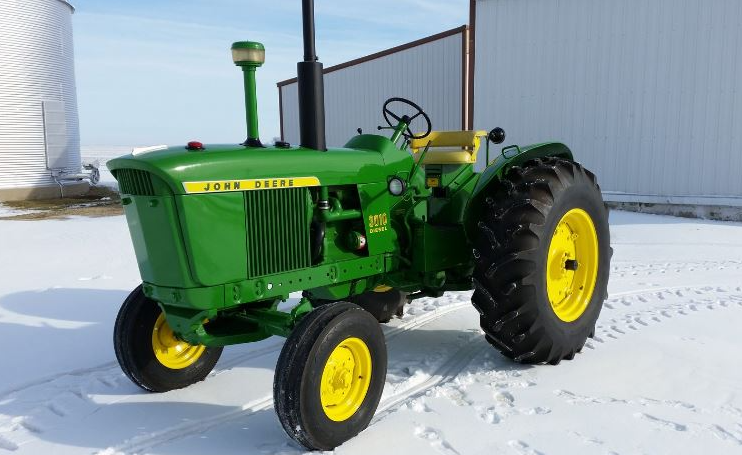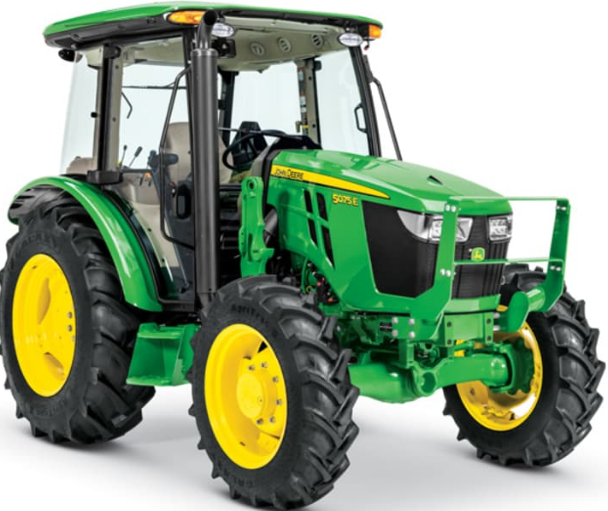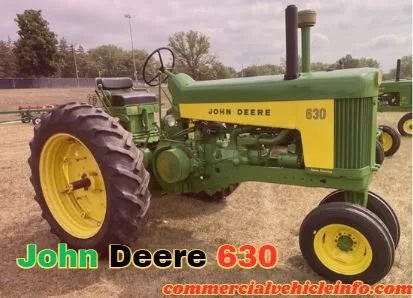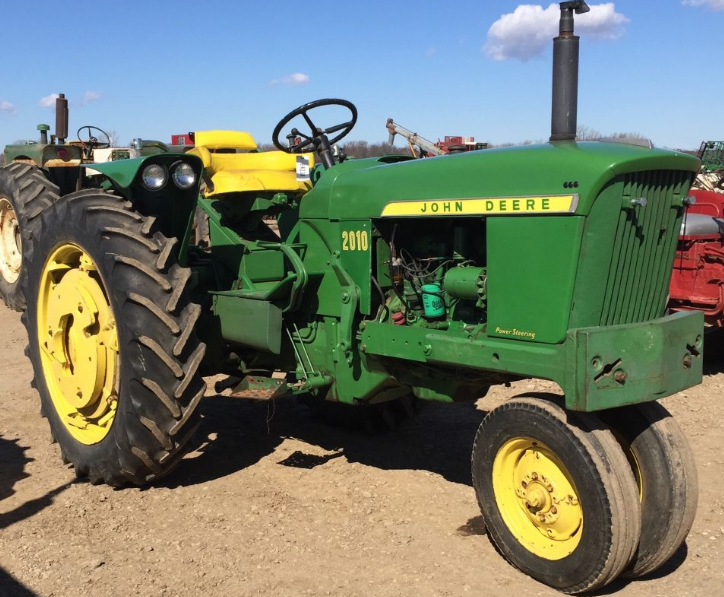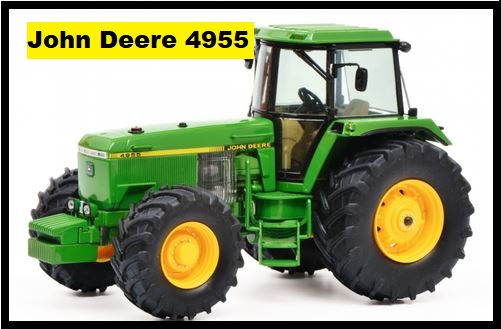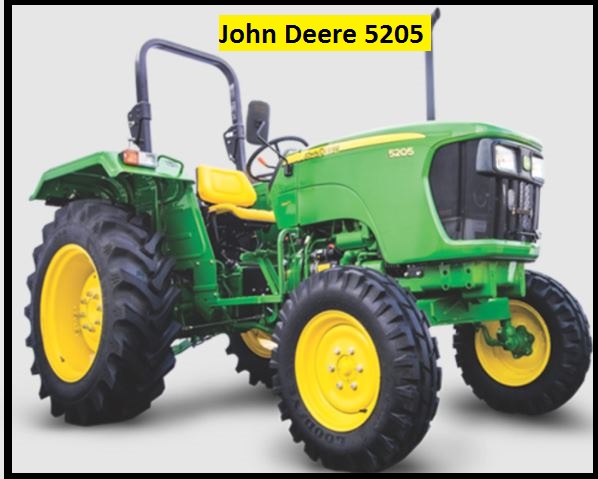If you’re looking for John Deere Gator 825i Problems and their solutions, you’ve come to the right place. Our team has confirmed this information with several John Deere representatives and associates.
Let’s talk about the John Deere Gator 825i Problems and their solutions. Finding complete information on the internet can be challenging.
Therefore, we prefer that you save your precious energy and time. Our team has compiled complete information on John Deere Gator 825i Problems to make your search easier.
So, without further ado, let’s get to the main topic.
You May Like It
- john deere d105 used value
- john deere 2305 problems
- john deere tractors cost
- d110 john deere
- 1025r john deere specs
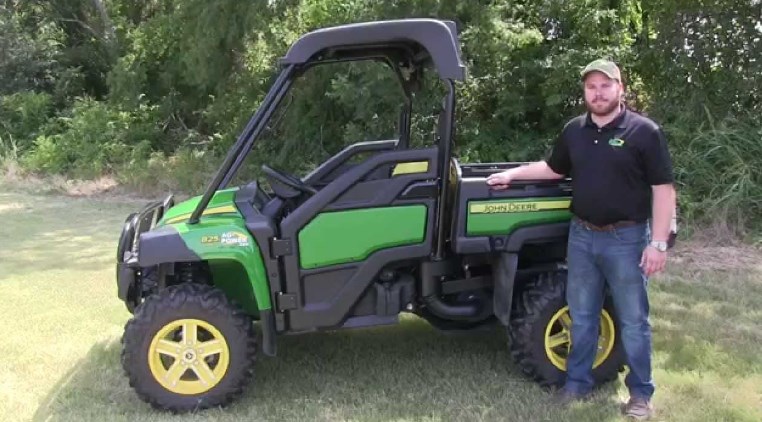
Most Common John Deere Gator 825i Problems
John Deere Gator 825i Starter Problems
Outlined below are several prevalent problems that can arise with the starter in the John Deere Gator 825i:
- Starter Fails to Turn the Engine Over: This issue can stem from various sources, such as a drained battery, a malfunctioning starter solenoid, or a faulty starter motor.
- Clicking Noises from the Starter: If the starter emits clicking sounds but doesn’t initiate engine turnover, factors like a weak battery, a defective starter solenoid, or a malfunctioning starter motor might be at play.
- Slow Engine Cranking: Slow engine cranking can occur due to reasons like a low battery, a problematic starter solenoid, or a faulty starter motor.
- Engine Cranks, but Doesn’t Start: When the starter cranks the engine, but the engine fails to start, issues such as a faulty spark plug, a malfunctioning ignition coil, or a problematic fuel injector could be contributing factors.
- Starter Seizure: A starter can become seized if it isn’t used regularly or if it sustains damage.
John Deere Gator 825i Clutch Problems
Outlined below are several prevalent problems that can arise with the clutch in the John Deere Gator 825i:
- Clutch Slipping: Clutch slipping occurs when the clutch plates fail to engage fully, causing the engine to rev up without the vehicle moving. Possible causes include worn clutch plates, a defective clutch master cylinder, or a faulty clutch slave cylinder.
- Clutch Chatter: Clutch chatter manifests as vibrations when the clutch is engaged or disengaged. It can be brought about by factors such as worn clutch plates, a malfunctioning clutch release bearing, or a faulty clutch disc.
- Clutch Drag: Clutch drag occurs when the clutch plates don’t disengage fully, resulting in the engine running while the vehicle is in neutral. This issue can be triggered by worn clutch plates, a faulty clutch master cylinder, or a defective clutch slave cylinder.
- Clutch Noise: Noises from the clutch can occur due to various reasons, including worn clutch plates, a malfunctioning clutch release bearing, or a faulty clutch disc.
- Clutch Failure: Clutch failure refers to a complete breakdown of the clutch system, rendering the vehicle undrivable. This can be attributed to factors like worn clutch plates, a faulty clutch master cylinder, or a defective clutch slave cylinder.
John Deere Gator 825i Overheating Problems
Here are the most prevalent issues that can lead to engine problems in the John Deere Gator 825i:
- Insufficient Coolant Level: The primary reason for overheating is often an inadequate coolant level. Ensure that the coolant reaches the full marker on the radiator.
- Radiator Blockage: The radiator can get obstructed by dirt, debris, or insects, impeding proper coolant circulation.
- Malfunctioning Thermostat: Responsible for regulating coolant flow through the engine, a faulty thermostat can hinder coolant transfer to the radiator, resulting in engine overheating.
- Defective Water Pump: The water pump’s role in circulating coolant throughout the engine is crucial. A malfunctioning pump can disrupt proper coolant circulation, leading to overheating.
- Leaky Hoses or Gaskets: Coolant leakage due to damaged hoses or gaskets can prompt engine overheating.
- Engine Overexertion: Subjecting the engine to excessive workloads can cause it to overheat. It’s essential to avoid overloading the engine and refrain from extended periods of high-speed operation.
Should your John Deere Gator 825i experience overheating, prompt troubleshooting and resolution are imperative. Engine overheating can result in engine damage and a reduced operational lifespan.
John Deere Gator 825i Battery Problems
Here are the most typical battery-related issues encountered with the John Deere Gator 825i:
- Insufficient Battery Voltage: The most prevalent problem involves low battery voltage, which can stem from various sources. Potential causes encompass a weakened battery, loose or corroded battery connections, or a parasitic drain.
- Depleted Battery: A dead battery can occur due to age or excessive discharge.
- Battery Sulfation: This refers to a chemical reaction leading to the accumulation of deposits on the battery plates, diminishing their capacity to hold a charge.
- Corroded Battery Terminals: Corrosion on the battery terminals can result in poor connectivity between the battery and cables, leading to power loss.
- Impaired Battery Casing: A damaged battery case can cause leaks or discharge loss.
If you’re grappling with battery problems concerning your John Deere Gator 825i, consider these steps for resolution:
- Assess Battery Voltage: Employ a voltmeter to gauge the battery voltage. In cases of low voltage, you might need to recharge or replace the battery.
- Inspect Battery Connections: Verify the cleanliness and tightness of the battery connections.
- Investigate Parasitic Drain: Employ a multimeter to detect parasitic drain—a minute current persistently flowing from the battery even when the vehicle is switched off.
- Clean Battery Terminals: Employ a wire brush to eliminate any corrosion from the terminals.
- Replace the Battery: If the battery is old or damaged, it’s advisable to replace it.
John Deere Gator 825i Transmission Problems
Here are the most prevalent transmission-related issues encountered with the John Deere Gator 825i:
- Challenging Gear Shifting: A frequently encountered problem is hard shifting, which can be attributed to several factors. Possible culprits encompass insufficient fluid level, worn or damaged gears, or a malfunctioning shift solenoid.
- Power Loss: Power loss can stem from various sources. Possible causes involve a slipping belt, a defective torque converter, or engine-related problems.
- Unusual Noises (Clunking or Whining): Uncharacteristic clunking or whining sounds can emanate from worn or impaired gears, a malfunctioning bearing, or belt-related issues.
- Transmission Leaks: Transmission leaks can manifest due to diverse reasons. Likely triggers comprise a faulty seal, loose fittings, or cracks in the transmission housing.
- Clutch Slippage: The clutch is pivotal for engaging and disengaging the transmission. Should the clutch start to slip, it can lead to power loss or produce abnormal noises.
John Deere Gator 825i Fuel System Problems
Here are the most frequent fuel system-related issues observed in the John Deere Gator 825i:
- Blocked Fuel Filter: A clogged fuel filter can hinder the smooth flow of fuel to the engine, leading to suboptimal performance or even engine failure.
- Defective Fuel Pump: Responsible for transferring fuel from the tank to the engine, a malfunctioning fuel pump can result in compromised engine performance or complete failure to start.
- Impaired Fuel Injectors: Fuel injectors play a crucial role by spraying fuel into the engine cylinders. If these components are dirty or malfunctioning, they can adversely affect engine operation or prevent it from starting.
- Fuel Line or Hose Leaks: Leaky fuel lines or hoses can cause fuel to escape onto the ground or enter the engine compartment, posing a significant fire hazard.
- Obstructed Fuel Tank Vent: The fuel tank vent permits air to enter the tank as fuel is utilized. An obstruction in this vent can lead to pressurization of the fuel tank and potential fuel overflow.
John Deere Gator 825i Electrical Problems
Here are the most prevalent electrical issues that can arise with the John Deere Gator 825i:
- Wiring Complications: The electrical system within the John Deere Gator 825i is intricate and can be susceptible to wiring problems. Such issues can be triggered by several factors, including loosely connected or corroded components, short circuits, or damaged wires.
- Malfunctioning Fuses: Fuses are designed to safeguard the electrical system from overloads. The blowing of a fuse serves as an indicator of an underlying problem within the electrical setup.
- Defective Sensors: The John Deere Gator 825i incorporates multiple sensors to monitor the engine and various systems. If any sensor malfunctions, it can give rise to an array of issues, such as failure to start the engine or non-functional lights.
- Faulty Alternator: The alternator plays a pivotal role in charging the battery. A faulty alternator can lead to battery drain and vehicle stalling concerns.
- Impaired Starter: Responsible for initiating the engine’s operation, a malfunctioning starter can result in engine non-starting scenarios.
John Deere Gator 825i Steering Problems
Here are the most prevalent steering-related issues that can occur with the John Deere Gator 825i:
- Power Steering Pump Malfunction: The power steering pump is accountable for supplying hydraulic fluid to the power steering system. In the event of pump failure, steering can become arduous or even impractical.
- Power Steering Fluid Leakage: Leakage of power steering fluid can result in diminished pressure within the power steering system, leading to challenging or impossible steering.
- Steering Rack and Pinion Breakdown: The steering rack and pinion form the pivotal part of the power steering system responsible for turning the wheels. If this component malfunctions, steering can become unmanageable.
- Slackened or Damaged Steering Components: Steering difficulties or veering to one side can stem from slackened or impaired steering components, including tie rods or steering linkages.
- Steering Wheel Vibrations: Vibrations in the steering wheel can originate from various sources, such as imbalanced tires, worn wheel bearings, or a flawed steering component.
John Deere Gator 825i Brake Problems
Here are the most prevalent brake-related issues that can arise with the John Deere Gator 825i:
- Brake Fluid Leakage: Leakage of brake fluid can result in spongy or non-functional brakes.
- Deteriorated Brake Pads: Worn brake pads can lead to brakes producing squealing or grinding noises.
- Worn Brake Rotors: Brake rotors that have worn down can cause brakes to generate vibrations or produce pulsating sounds.
- Adhering Brake Caliper: A brake caliper that sticks can cause the brakes to drag and make it challenging to bring the vehicle to a halt.
- Presence of Air in Brake Lines: Air within the brake lines can lead to a spongy brake feel or cause the vehicle to veer to one side when braking.
John Deere Gator 825i Suspension Problems
Here are the most prevalent suspension-related issues that can occur with the John Deere Gator 825i:
- Worn Shock Absorbers: Shock absorbers are responsible for cushioning bumps and maintaining a smooth ride. Worn shocks can result in a rough ride, bouncing, or swaying of the vehicle.
- Loose or Damaged Suspension Components: Components like springs, struts, or control arms can become loose or damaged, leading to an uneven ride or the generation of noise.
- Rust or Corrosion: The presence of rust or corrosion can weaken suspension parts, potentially causing them to fail over time.
- Impact-Induced Damage: Impact damage from encounters like hitting a pothole or a curb can lead to harm to suspension components, affecting the vehicle’s suspension performance.
- Overloading Strain: Overloading the vehicle can place excessive stress on the suspension, leading to the potential failure of components.
John Deere Gator 825i Tire Problems
Here are the prevalent tire problems that can arise with the John Deere Gator 825i:
- Flat Tires: Among the most frequent tire challenges, flat tires occur due to factors like encountering sharp objects, driving over potholes, or placing excessive weight on the vehicle.
- Tire Wear: Over time, tires will naturally experience wear. This process can be expedited by driving on uneven or rugged terrains, or by subjecting the vehicle to heavy loads.
- Tire Imbalance: Tire imbalance can lead to vehicle vibrations. This issue may arise from uneven tire wear, a wheel that’s been bent, or a lug nut that’s come loose.
- Tire Alignment: Proper tire alignment is vital. If the tires are not positioned correctly on the vehicle, it can cause the vehicle to pull to one side or render it challenging to maintain control.
- Tire Pressure: Maintaining accurate tire pressure is crucial. Insufficient pressure can lead to premature tire wear and subpar vehicle handling. Conversely, excessive pressure can result in tire overheating and potential bursting.
John Deere Gator 825i Belt Problems
Highlighted below are some of the common problems that can occur with belts in the John Deere Gator 825i:
- Squealing or Chirping: One of the most recognizable signs of belt problems is a squealing or chirping noise. This can be attributed to various causes, such as a loose belt, a worn belt, or pulleys that are not properly aligned.
- Belt Slippage: When the belt is excessively loose or the pulleys are misaligned, belt slippage can occur. This issue has the potential to lead to engine overheating or a decrease in vehicle power.
- Belt Cracks or Tears: The presence of cracks or tears on the belt is indicative of wear and tear, signaling the need for a replacement.
- Belt Glazing: Belt glazing arises when the belt becomes smooth and glossy. This phenomenon can occur due to inadequate lubrication or when the belt is exposed to high temperatures.
- Belt Binding: If the belt is too tight or the pulleys are not aligned correctly, belt binding can result. This can result in consequences like engine overheating or a decrease in vehicle power.
Conclusion
John Deere Gator 825i is a reliable utility vehicle that is used for various tasks. However, it is prone to problems like any other machine.
The most common problems with John Deere Gator 825i are overheating, battery problems, transmission problems, fuel system problems, electrical problems, steering problems, brake problems, suspension problems, tire problems, and belt problems.
By following the tips provided in this article, you can fix these problems and keep your Gator running smoothly. For more details visit the commercialvehicleinfo.com
Deere Gator 825I FAQs

The most common problems with the John Deere Gator 825i are power loss, running rough, clutch problems, starting issues, and steering issues.
Power loss in the John Deere Gator 825i can be caused by various factors such as clogged air filters, low fuel pressure, or a faulty fuel pump. To fix this issue, you should check and clean the air filters, check the fuel pressure, and replace the fuel pump if necessary.
If your John Deere Gator 825i is running rough, it could be due to issues with the fuel system, such as clogged fuel injectors or a faulty fuel pump. You should check and clean the fuel injectors, check the fuel pressure, and replace the fuel pump if needed.
Clutch problems in the John Deere Gator 825i can be caused by issues such as worn clutch plates or a faulty clutch assembly. You should inspect the clutch plates for wear and replace them if necessary. If the problem persists, you may need to replace the entire clutch assembly.
Starting issues in the John Deere Gator 825i can be caused by a weak battery, a faulty starter motor, or a problem with the ignition system. You should check the battery voltage, clean the battery terminals, and replace the battery if needed. If the problem persists, you may need to replace the starter motor or troubleshoot the ignition system.
Steering issues in the John Deere Gator 825i can be caused by problems with the power steering system, such as low power steering fluid or a faulty power steering pump. You should check the power steering fluid level and add more if needed. If the problem persists, you may need to replace the power steering pump.
Overheating in the John Deere Gator 825i can be caused by issues such as a clogged radiator, low coolant level, or a malfunctioning thermostat. You should check and clean the radiator, check the coolant level, and replace the thermostat if necessary.
To prevent overheating in the John Deere Gator 825i, you should regularly clean the radiator, check the coolant level, and ensure proper airflow to the engine. It is also important to avoid overloading the vehicle and operating it within the recommended temperature range.
Fuel system problems in the John Deere Gator 825i can be caused by issues such as a clogged fuel filter, a faulty fuel pump, or a malfunctioning fuel injector. You should check and replace the fuel filter, check the fuel pump for proper operation, and clean or replace the fuel injectors if needed.
Electrical problems in the John Deere Gator 825i can be caused by issues such as a dead battery, loose connections, or a faulty alternator. You should check the battery voltage, tighten all electrical connections, and test the alternator for proper charging. If necessary, replace the battery or alternator.

